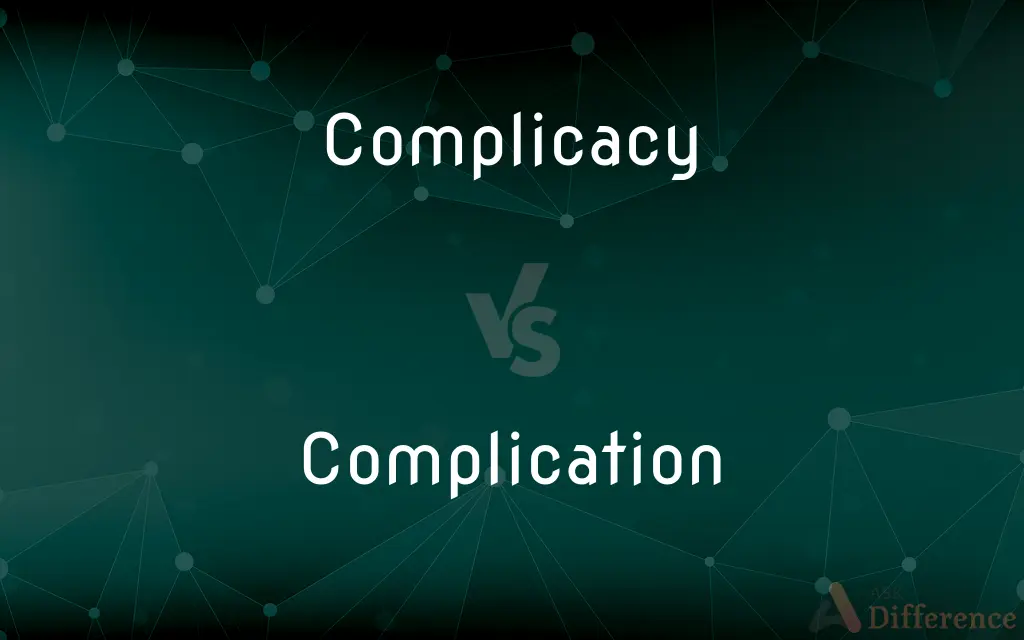Complicacy vs. Complication — What's the Difference?
Edited by Tayyaba Rehman — By Urooj Arif — Updated on March 30, 2024
Complicacy refers to the state of being complex or intricate, emphasizing abstract qualities, while complication denotes a specific problem or difficulty arising in a situation or process.

Difference Between Complicacy and Complication
Table of Contents
ADVERTISEMENT
Key Differences
Complicacy often describes the inherent complexity or intricacy of an abstract concept, suggesting something that is challenging to understand or unravel due to its nuanced or elaborate nature. On the other hand, complication usually refers to an unforeseen problem or difficulty that arises in the course of a process, making a situation harder to resolve or understand.
While complicacy highlights the abstract qualities that contribute to the complexity of an idea or theory, emphasizing the depth and interconnectedness of its components, complication focuses on the practical challenges or obstacles that emerge, often unexpectedly, affecting the progression or outcome of specific tasks or operations.
Complicacy is used to express the inherent difficulty in understanding or dealing with a concept due to its elaborate or multifaceted nature, suggesting a level of sophistication or complexity that requires careful analysis or consideration. Whereas, complication denotes the introduction of an additional factor or issue that complicates a scenario, creating obstacles or delays that must be navigated or resolved.
In discussing intellectual or theoretical matters, complicacy is often invoked to articulate the complex nature of subjects such as philosophy, mathematics, or technology, underscoring the intellectual effort required to grasp them. Complication, in contrast, is more commonly associated with practical, real-world situations, such as medical procedures, project management, or mechanical repairs, where unexpected issues can arise and impact outcomes.
Complicacy can enrich a discussion by highlighting the depth and intricacy of a topic, offering a perspective that appreciates the complexity of the matter at hand. Complication, however, often signifies hurdles or problems that need to be overcome, bringing attention to the need for problem-solving or adaptation in face of unforeseen challenges.
ADVERTISEMENT
Comparison Chart
Definition
State of being complex or intricate
A specific problem or difficulty arising
Context
Abstract concepts, theories
Practical, real-world situations
Emphasis
Inherent complexity
Unforeseen problems or obstacles
Usage
Describes nuanced or elaborate nature of ideas
Refers to issues affecting progress or understanding
Implication
Intellectual effort and analysis
Need for problem-solving or adaptation
Compare with Definitions
Complicacy
The complicacy of modern art forms can be intriguing.
Viewers are often drawn to the complicacy of modern art forms.
Complication
A sudden complication in the surgery required quick thinking.
Surgeons often have to deal with unexpected complications during procedures.
Complicacy
The brain's architecture exhibits remarkable complicacy.
Neuroscientists study the brain's architecture to understand its complicacy.
Complication
Project timelines can be affected by unforeseen complications.
Managers try to anticipate complications to keep projects on track.
Complicacy
The complicacy of quantum mechanics often baffles students.
Understanding the complicacy of quantum mechanics requires considerable intellectual effort.
Complication
Financial complications can derail a business plan.
Businesses must plan for financial complications to ensure stability.
Complicacy
Literary theories are known for their complicacy.
The complicacy of literary theories makes them a challenging subject of study.
Complication
Technical complications can frustrate users.
Resolving technical complications is crucial for maintaining user satisfaction.
Complicacy
Software development involves a high degree of complicacy.
The complicacy of software development necessitates a thorough understanding of programming languages.
Complication
Complications in the design were discovered during testing.
Identifying complications early can save time and resources.
Complicacy
The state of being complicated.
Complication
The act of complicating.
Complicacy
A complication.
Complication
A confused or intricate relationship of parts.
Complicacy
The state of being complex; entanglement.
Complication
A factor, condition, or element that complicates.
Complicacy
That which is and renders complex; intricacy; complication.
Complication
(Medicine) A secondary disease, an accident, or a negative reaction occurring during the course of an illness and usually aggravating the illness.
Complicacy
A state of being complicate or intricate.
Complication
The act or process of complicating.
Complication
The state of being complicated; intricate or confused relation of parts; complexity.
Complication
A person who doesn't fit in with the main scheme of things; an interloper.
Complication
(medicine) A disease or diseases, or adventitious circumstances or conditions, coexistent with and modifying a primary disease, but not necessarily connected with it.
Complication
(horology) A feature beyond basic time display in a timepiece.
Complication
The act or process of complicating; the state of being complicated; intricate or confused relation of parts; entanglement; complexity.
A complication of diseases.
Through and beyond these dark complications of the present, the New England founders looked to the great necessities of future times.
Complication
A disease or diseases, or adventitious circumstances or conditions, coexistent with and modifying a primary disease, but not necessarily connected with it.
Complication
The act or process of complicating
Complication
A situation or condition that is complex or confused;
Her coming was a serious complication
Complication
Any disease or disorder that occurs during the course of (or because of) another disease;
Bed sores are a common complication in cases of paralysis
Complication
A development that complicates a situation;
The court's decision had many unforeseen ramifications
Complication
Puzzling complexity
Common Curiosities
How do complicacy and complication differ in usage?
Complicacy is used in contexts involving abstract complexity, while complication is used when referring to specific, often unexpected, problems.
Is complicacy always negative?
Not necessarily; complicacy can simply denote complexity or intricacy without a negative connotation, highlighting depth and sophistication.
What is a complication?
A complication is a specific problem or difficulty that arises, making a situation or process more difficult to understand or resolve.
Are complications always unforeseen?
While complications are often unforeseen, some can be anticipated in scenarios where potential issues are predictable.
Can a situation have both complicacy and complications?
Yes, a situation can exhibit complicacy in its inherent complexity and also face complications in the form of unforeseen problems.
Can the complicacy of a subject be measured?
While it's challenging to quantitatively measure complicacy, it can be qualitatively assessed based on the complexity of concepts involved.
How can complicacy be addressed?
Addressing complicacy typically involves thorough analysis, understanding, and sometimes simplification of the complex elements involved.
How does one identify a complication?
Complications are identified through monitoring, testing, or when a process deviates from its expected course, presenting problems.
What is complicacy?
Complicacy refers to the state of being complex or intricate, especially in relation to abstract concepts or theories.
Do complicacy and complication apply only to technical fields?
No, these terms can apply to various fields, including but not limited to, technical, medical, artistic, and theoretical domains.
How does understanding complicacy benefit one's study or work?
Understanding complicacy helps in appreciating the depth and nuance of a subject or task, leading to more informed decisions and solutions.
What strategies can be used to handle complications?
Handling complications may require problem-solving skills, adaptation, and sometimes contingency planning to overcome unforeseen issues.
Can complications be positive?
Rarely, complications can lead to unforeseen opportunities or learning experiences, though they are generally seen as hurdles.
What role do complications play in project management?
In project management, complications represent challenges that must be managed to ensure the project progresses and meets its objectives.
How does one's approach differ when dealing with complicacy versus complications?
Dealing with complicacy involves intellectual engagement and analysis, while handling complications requires practical problem-solving and adaptability.
Share Your Discovery

Previous Comparison
Action vs. Move
Next Comparison
Slag vs. SlawAuthor Spotlight
Written by
Urooj ArifUrooj is a skilled content writer at Ask Difference, known for her exceptional ability to simplify complex topics into engaging and informative content. With a passion for research and a flair for clear, concise writing, she consistently delivers articles that resonate with our diverse audience.
Edited by
Tayyaba RehmanTayyaba Rehman is a distinguished writer, currently serving as a primary contributor to askdifference.com. As a researcher in semantics and etymology, Tayyaba's passion for the complexity of languages and their distinctions has found a perfect home on the platform. Tayyaba delves into the intricacies of language, distinguishing between commonly confused words and phrases, thereby providing clarity for readers worldwide.














































